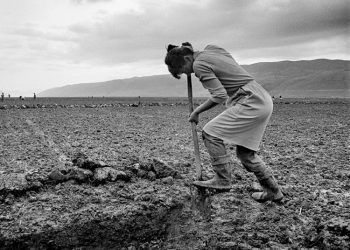NIKOLLË LOKA
ALFDRED DUKA
NIKOLIN KURTI
The fifth part
WHY DOES THE POLITICAL ACCUSATION OF COLLABORATION NOT STAND?
-Continuing the tradition of native Catholic clergy –
Continues from last issue
The rapprochement with the Italians is also motivated by the many economic needs of the Albanian Catholic Church!
Even with studies in the service of one’s nation
A first attempt to organize scientific activity was made in 1940 with the creation of the Institute of Albanian Studies in which, under the conditions of the Italian occupation, well-known Albanian and Italian researchers of language, literature and art were included. The first chairman of this Institute was Ernest Koliqi and the general secretary, Zef Valentini, while among the members, there were prominent intellectuals such as: Aleksandër Xhuvani, Ekrem Vlora, Eqrem Çabej, Karl Gurakuqi, Kolë Kamsi, Lasgush Poradeci, Lazër Shantoja, Sotir Kolea , Vangjel Koça, etc.
In 1942, it was called the Albanian Royal Institute, under the Prime Minister’s Office. In the period of the German occupation (1944) the Institute was reorganized and named the Institute for Studies and Arts, with the expansion of research fields and the number of researchers, now only Albanians divided into three branches: linguistics, arts and natural and technical science.
Although he did not play the role of a politically engaged intellectual during the War, Kurti could not remain indifferent to the fate of his nation. He was ready to help, as soon as that help was asked of him. In 1944, the director of the Institute for Studies and Arts was Odise Paskali. He invited Dom Shtjefën Kurti for cooperation, as he had the skills to engage in scientific research work.
In Pascal’s letter it is written:
The Albanian Institute of Arts created a special section in its own right, the “Kosova” Section, and formed a special Commission composed of our students of ethnic Albanian issues and intellectuals from Kosovo. The purpose of this new section and this Commission is to collect material and documents on the historical, economic, scientific and generally cultural issues related to Kosovo and other ethnic Albania. But in order to achieve this patriotic enterprise as best and as quickly as possible, the “Kosova” Commission finds it necessary to cooperate as closely as possible with all private entities that demonstrate competence in any of the branches that are listed in the attached list, and not only in terms of Kosovo, but also other parts of ethnic Albania.
Appreciating your patriotic contribution, this Institute will gladly welcome any foreign work or study that is included in the branches of the attached list as well as any historical, antique, etc. documents that you can preserve. you or your friends, who have to be useful in the formation of a historical documentary and of the various collections that will be created near the ‘Kosova’ Section. Your contribution, whatever its nature, will be rewarded in cash, in the amount that will be determined by the “Kosovo” Commission.
There is no information in which field Shtjefën Kurti was active, but it is known that the Institute in question conducted studies in the field of toponymy and replaced Slavic toponyms with Albanian toponyms of the settlements of Kosovo, where the help of Shtjefën Kurti, as a good acquaintance of Kosovo, it was very valuable.
In the first days after liberation
Kurti also manifests the spirit of cooperation with the Partisan Military Command, just a few days after the liberation of Tirana, when Albania had not yet been completely liberated:
Parish Office
Of the Catholic Church
Tirana 22.XI.1944
Pro. No. 366/44
P.T. Tirana District Command
If they know that this Community is lacking bread, and it cannot be obtained from the ovens, we are asking that Command to allow the bringing of an amount of up to two quintals of wheat or corn flour.
The parish priest
Don Shtjefën Kurti
The departure of the invaders, under other conditions, would have been a great joy for the clergy, but the seizure of power by the communists did not fit their idea of freedom and human rights, which had never been implemented in Albania, but under the communists they would to be trampled more. However, the Church was expected to join the popular joy for the liberation of the country and extend a hand to the new government for cooperation. On this occasion, it should be emphasized that, despite the rampant propaganda about “the great popular joy on the occasion of the union of Albania with Italy and the benefits of this union”, the Catholic Church as an institution and not even the cleric Kurti, as part of it, joined fascist propaganda and did not organize religious ceremonies to justify the occupation. Without propaganda and with deeds, the Albanian Catholic Church had stayed close to the aspirations of its people.
With a special letter, Dom Shtjefni invites the leaders of the National Liberation Military Command: “On Tuesday, November 28, on the occasion of the anniversary of Albanian Independence, at 9 o’clock, a “Te Deun” will be sung in the Tirana Catholic Parish Church, to the Great Promenade. We have the honor with the military authorities of that Command, to participate in the occasion ceremony. He also sent you the holiday program attached.”
Major General Mehmet Shehu also participated in “Te Duem”. That same day, Dom Shtjefën Kurti had been in the tribune on the occasion of the victory parade of the forces of the National Liberation Army, alongside other leaders of religious communities. Obstacles to the Church started in the first days after liberation. Dom Shtjefni informs the state authorities of the new government, about the negligence shown in the illumination of Tirana for Christmas in 1944, a practice that was apparently carried out regularly:
Parish Office
Of the Catholic Church
Tirana
Prot. No. 403/44
Tirana 24.XII.1944
Of the National-Liberation Council
Chairmanship of the City Council
Tirana
According to the authorities, we have not been provided with lighting for tonight at midnight, contrary to what we have informed you with our letter Prot. No. 395/44, dated 20 we inform you that tonight at midnight, no ceremony will take place in the Churches of the Capital.
The parish priest
Don Shtjefën Kurti
For the accusers of Dom Shtjefën Kurti for his “collaboration with the invaders”, the question must be asked: What should the vicar of Tirana not do in those conditions and what should he do better? The very term “collaborationist” means a person who helps or gives support to the enemy during the war. From what we presented above, based on numerous archival documents, the cooperation of cleric Kurti with the authorities was strictly limited to his duties as parish priest and in all cases where the church needed that cooperation. The rigorous application of his status as a clergyman to avoid interfering in political matters, especially during 1944, when the Holy See asked the Catholic clergy in Albania to engage more in politics in the name of “preventing communism from coming to power”, proves the opposite and should be interpreted as his anti-fascist stance.
LAWYER OF THE MARTYR CHURCH
Dom Shtjefën Kurti, representative of the Catholic Church at the time of the martyrs
Even after the liberation, Dom Shtjefni initially continued his religious activity normally and the church was full of believers, mostly young people. As the youth came out, with which the Church was filled, a strange thing, the bells rang to tear the people with the holy sacrament. The 1946 constitution allowed freedom of religion, but also imposed restrictions on the development of religious activities. In article 13 of the Constitution, the equality of citizens regardless of religion, race or nationality was underlined and the punishment of any kind of discrimination based on religion, race, or nationality was declared, while in its article 16, the separation of the state and the church was announced.
Freedom of belief and exercise of duties by religious communities was protected by law. On the other hand, it was forbidden to engage clerics in politics as well as to use religion for political purposes. However, the issuance of the Constitution was not accompanied by the issuance of legal provisions. The relations between the political power and the religious entities continued to be regulated, even for several years, in accordance with the religious law of 1929. Catholicism in Albania had a deeply western orientation, which differentiated it from other communities.
In a February 1945 memorandum, sent by the diplomatic missions of the United Kingdom, the United States of America and France in Tirana, to the Archbishop of Shkodra Monsignor Gaspër Thaqin, the difficult economic conditions of Albania, unmotivated executions, morale were described and the high motivation of the fugitives in the mountains and it was proposed that contacts with the British mission in Tirana be made through Dom Shtjefën Kurti. If we look at the correspondence of the Albanian Catholic Church, it turns out that the cleric who was officially in charge of the communication of the Albanian Catholic Church with the state and foreign missions was Dom Shtjefën Kurti.
Shtjefën Kurti, according to the statements of some clerics such as; Pjetër Meshkalla and Alfons Tracki, he was the one who had the closest relationships with foreigners. He informed the foreign missions about the condition of the fugitives, looking for ammunition, clothes, food, etc. On the other hand, the clerics from their cells gathered to write reports for the Vatican, which they would send through the Italian, French, British and American missions. In these reports, superiors in Rome are informed about the terror and persecution that the Catholic Clergy was suffering and about the situation in Albania. While the Vatican, through Dom Shtjefën Kurti, sent instructions for the activity towards the regime, as well as aid.
Kurti had regular contact with a member of the British Mission in Tirana, to whom he handed a memorandum written in French by the Albanian bishops in four copies: one copy for the English, American and French missions in Tirana and one copy that remained in Tirana Parish office. This copy was later found by Sheti’s security agencies and used criminally against him after his arrest. A few days after receiving the memorandum and the report on the situation in the country, the British diplomat, Antony Stevenson, after attending the Holy Mass, pays a visit to parish priest Kurti, confirms the receipt of the letter and offers him his help in the future. Dom Shtjefën Kurti, together with Monsignor Vinçenc Prenushin, had met with the English diplomat, Hudgson at the English Mission. He had translated the conversation, as he spoke French very well. Hudgson was very pessimistic; apparently it was the time when the Tirana government’s relations with the British were cooling down, at least apparently.
Kurti also kept in touch with special exponents who had fled to the mountains. The German priest Alfons Tracki, from the mountains of the diocese of Pulti, writes to Dom Shtjefni in Tirana: “The terrible sufferings that we have been going through for months, prompted me to inform you about my friends who are in the mountains of Dukagjin (………… ……..). Please see to it that this committee and the English who are in Tirana and have undertaken to equip the army of freedom, give us everything that is necessary (…………………) we look forward to giving him freedom the Albanian people.
Dom Shtjefni, as the person who would maintain the ties of the Catholic Church with the state authorities, was in the composition of every group that met with the state authorities. Monsignor Frano Gjini, as soon as he was appointed to his new position as Delegate of the Vatican, asked to appear before Enver Hoxha, at that time the head of the government of Tirana. He intended with this request to talk about the issue of Catholic schools, about the freedom of speech and the press, as well as about some of the economic measures that the government had taken against the Catholic Church. Economic measures in the communist system always preceded political measures. The meeting was mainly requested by Monsignor Gjini, because he could not remain indifferent to the official actions being carried out by the communist government against the Clergy, intelligentsia and Catholics in particular. The request for a meeting was made by Dom Shtjefën Kurti and signed on his behalf.
Tirana, on 27.III.1946
No. Extra
Chief of the Cabinet of the Prime Minister
Tirana
Gjinden is in Tirana, he came to present to the Prime Minister his congratulations on the formation of the new Government, Their Excellencies: Monsignor Prenushi, Archbishop of Durrës and Apostolic Administrator of South Albania, Mon. Gjergj Volaj, Bishop of Zadrima and representative of the Archbishop – Metropolitan of Shkodra, in his absence, Father Mati Prenushi, Provincial of Franceskaj; who, together with the undersigned, Don Shtejfën Kurti, Parish Priest and Dean of Tirana, began audience for what is super.
Please bring the notification to the Parish Office, phone number 172, “Catholic Church”.
Waiting for quick news, best regards.
Parish Priest – Dean
Dom Shtjefën Kurti
The official request for a meeting was made in December 1945, but the meeting did not take place on the pretext that the December elections were over. The real intention was to exclude the Catholic Church from social developments. Since coming to power, the communists have been careful in dealing with the Catholic Church, maintaining minimal cooperation with it, for things of a practical nature, and excluding it from any influence on social life.
At the end of World War II, there were 131 parishes with 93 diocesan clergy and 94 regulars. There was also an Apostolic Administration in the southern part of the country, two archdioceses (in Shkodër and Durrës), a nullius abbey, that of Saint Llesh in Orosh and three dioceses (Pulti, Sapa and Lezha). The male and female orders and congregations were: Franciscans and Jesuits, with a foreign majority, of Italian nationality; the sons of Don Orion, the Stigmatine Sisters, the Ancelle della Carità Sisters of Brescia, the Servant Sisters, the Daughters of Mary Help of Christians. Congregations of nuns were engaged not only in spiritual life, but also in social works, through charity works, educational activities, volunteers in health institutions, work in orphanages, etc.
Both the Franciscans and the Jesuits developed various activities in the field of schools and institutes, but also pastoral missions among people. As for formality, the state was interested in establishing a rule in communication, so it officially requested the list of the hierarchy of the Catholic Church.
Democratic Government of Albania
Ministry of Foreign Affairs
Tirana, on 10.IX.1945
No. prot:405.XVI
V.F. – LP
Presidency of the Catholic Community of Albania
The head parishioner
Tirana
For the service needs of the Protocol and Ceremonial Office of this Dicastery, please have the kindness to send us as soon as possible a list of the names of the leading persons of the Catholic Church of Albania, compiled according to hierarchical rank and divided according to prefectures, mentioning in it the function of each.
General Secretary.
Five days later, Dom Shtjefën Kurti, in his capacity as the President of the Catholic Community of Tirana, sends the answer to that letter to the Ministry of Foreign Affairs:
Tirana, September 15, 1945
Catholic Parish Office
Tirana
Prot. No. 292/45
P.T. Ministry of Foreign Affairs, Tirana
In response to your letter no. 405. A.XVI dt 10.IX.1945. We communicate the following:
The Hierarchy of the Catholic Church in Albania includes two Episcopal Sees (Kryepeshkopata), four Episcopal Sees (Pishkopata) and the Franciscan Province.
- His Excellency Gaspë Thaçi, Metropolitan Archbishop of the Archdiocese of Shkodra with headquarters in Shkodra.
- His Excellency Vençenc O.F.M. Archbishop of the Afridiocese of Durres and Administrator of South Albania, with headquarters in Durres (now temporarily in Delbnisht).
- His Excellency Bernardin Shllaku O.F.M. Bishop of the Diocese of Pult (Dukagjin), with headquarters in Kodër Shëngjergj.
- His Excellency Monsignor Gjergj Volaj, Bishop of the Diocese of Sapa (Zadrimë Pukë) with headquarters in Nenshat (Zadrimë).
- His Excellency Monsignor Frano Gjini, Bishop Abbot of Mirdita and Administrator of the Diocese of Lezha with Headquarters in Orosh.
- Very Reverend Father Mati Prennushi O.F.M. Provincial of the Franciscans of Albania with headquarters in Shkodër.
- Very Reverend Don Shtjefën Kurti, Parish Priest of Tirana, Chairman of the Catholic Community of Tirana. Memorie.al
With respect
President of the Tirana Catholic Community
Don Shtjefën Kurti




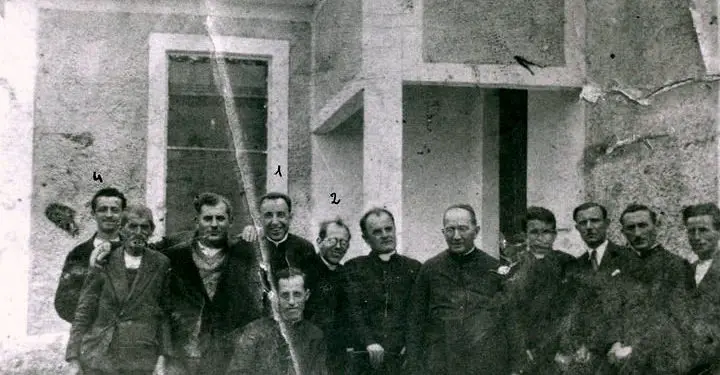
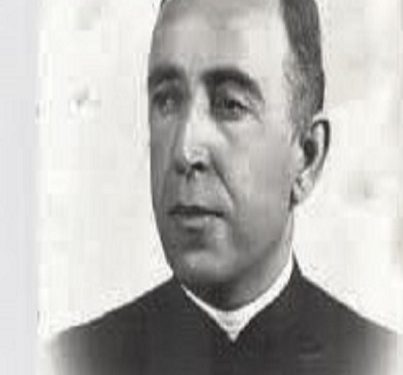
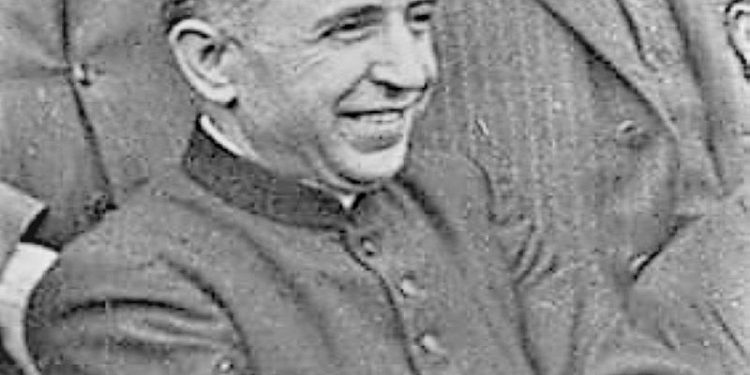
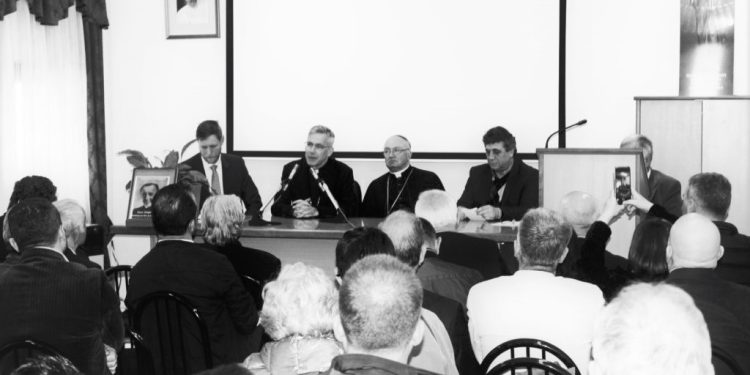
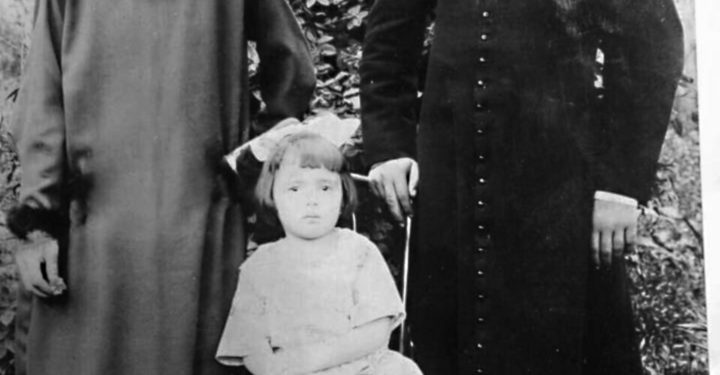
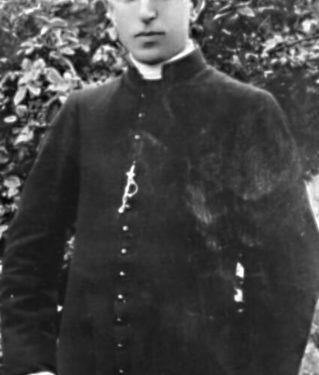
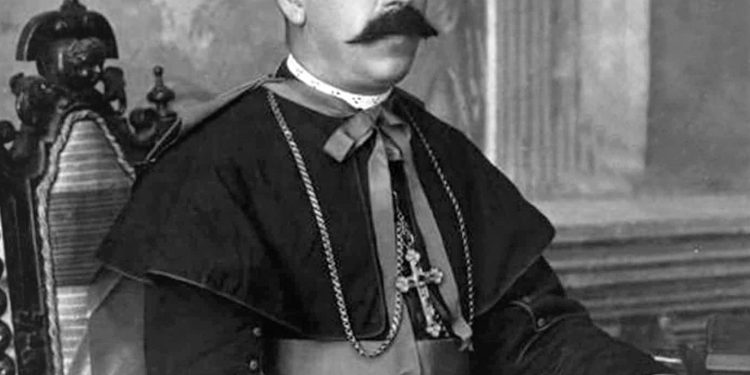

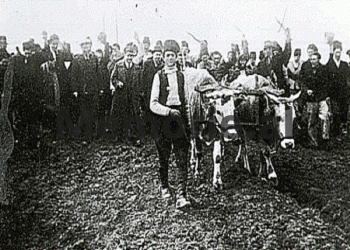
![“They have given her [the permission], but if possible, they should revoke it, as I believe it shouldn’t have been granted. I don’t know what she’s up to now…” / Enver Hoxha’s letter uncovered regarding a martyr’s mother seeking to visit Turkey.](https://memorie.al/wp-content/uploads/2026/01/Dok-1-350x250.jpg)

